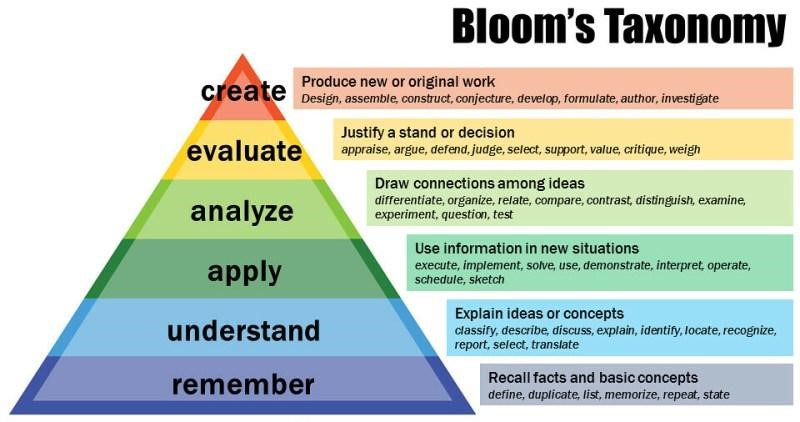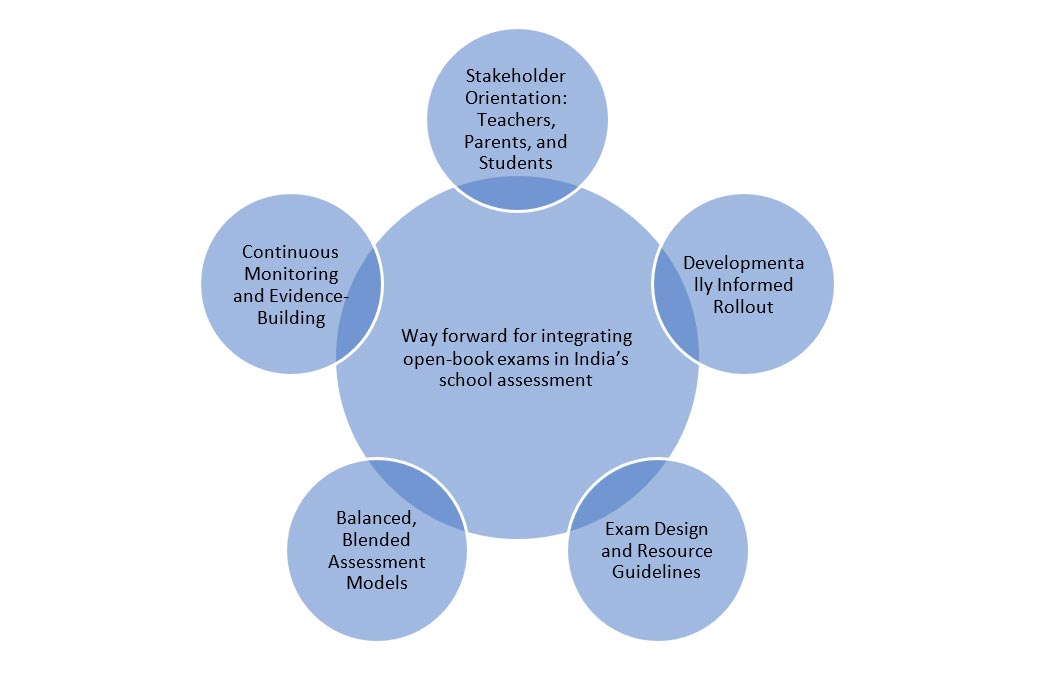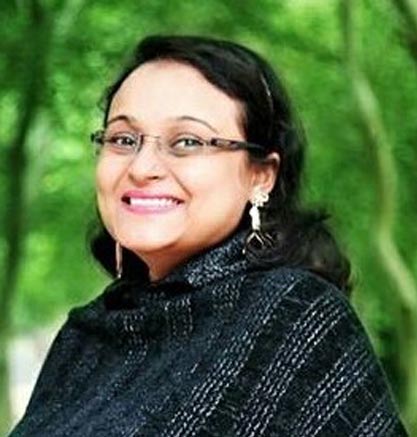-
CENTRES
Progammes & Centres
Location
India’s open-book exam initiative is not a silver bullet to move away from rote learning, but if carefully phased, it can catalyse a shift toward deeper learning

Image Source: Getty Images
The Central Board of Secondary Education (CBSE) in India has approved the introduction of open-book exams for Class 9 starting from the academic year 2026-27. A pilot test conducted in November-December 2023, for English, Mathematics, and Science in Classes 9 and 10, and for English, Mathematics, and Biology in Classes 11 and 12, showed positive results and strong teacher support for the measure. However, CBSE is only recommending its implementation and not making it mandatory, leaving room for schools to opt in based on readiness and capacity. In 2023, Kerala’s Higher Education Exam Reforms Commission had proposed open-book formats limited to internal, practical exams instead of final board exams, reflecting caution and incremental adoption.
This article examines the rationale and benefits of open-book exams, while also highlighting the associated risks and limitations that necessitate careful consideration, and proposes practical solutions for India’s education system.
According to an estimate, the spread of the internet and the consequent increase in research output have led to the exponential expansion of scientific knowledge, which is doubling every 17.3 years. This presents challenges for learning, as it becomes impractical for any individual or institution to keep pace with all the new knowledge. Also, with digitalisation, knowledge is always accessible at hand. More than recall, what matters more is the ability to use resources effectively, evaluate and synthesise them, and apply information to real-world scenarios. So, the skill to be able to find the right information, at the right moment and be able to use it effectively has become increasingly important. Moreover, the rise of the knowledge economy and technological innovation has increased the importance of higher-order cognitive skills like critical thinking, creativity, adaptability, and decision-making.
As the educational focus shifts to lifelong learning, it needs to cultivate self-regulated learners with the ability to continuously acquire, adapt, and update knowledge.
Fast-paced technological change, automation, artificial intelligence, and green transitions continue to disrupt skills, requiring professionals to adapt quickly, integrate and apply knowledge across various domains and continuously re-skill. Accordingly, employers now seek a mix of competencies, i.e. knowledge, skills, attitudes, and behaviours rather than discipline-specific knowledge credentials. As the educational focus shifts to lifelong learning, it needs to cultivate self-regulated learners with the ability to continuously acquire, adapt, and update knowledge.
Educational assessments must reflect this reality of the world of work to remain valid and relevant. Therefore, the main objective of CBSE’s move is to shift away from rote learning and foster deeper conceptual understanding, critical thinking, and real-world application of knowledge. By changing the nature of the exam to design questions that assess analytical and problem-solving skills, it encourages students to engage more critically with the content(see figure 1).
Figure 1: Bloom’s taxonomy for teaching-learning

Source: Management and Strategy Institute
In addition to assessing higher-order skills, open-book assessments can help in reducing exam anxiety among students if they are provided with ‘fact sheets’ that have information like formulae and definitions.
Open-book assessments also align with global trends, as similar models exist or are being piloted in countries like Finland, Singapore, and the International Baccalaureate (IB) system. In Finland, the matriculation examination for high school has become fully digital and allows access to digital resources during exams. IB is piloting open-book exams in 270 schools worldwide, directly comparing outcomes with traditional closed-book settings.
Empirical literature comparing open-book exams and closed-book exams is fairly limited, with often mixed conclusions due to high diversity, i.e. of learner characteristics, levels, subjects and geographical locations. This section will examine their differential impact of both exam formats for crucial aspects like exam preparation, test anxiety, performance and long-term learning outcomes.
Exam format often influences test preparation and, therefore, influences learning. Overall, most studies find that students spend more preparation time in closed-book exams and attend classes less often for an open-book test. However, some find that motivated students spend as much time preparing for open-book exams and focus on understanding and synthesising knowledge, favouring higher-order learning.
Multiple studies across countries confirm that open-book exams were found to reduce test anxiety. For example, a 2021 study with medicine and dentistry students found that 77 percent of physicians and over 80 percent of medical students felt less stressed with an open-book exam. However, interpreting the effect of negative emotions (like anxiety) on cognitive performance as always detrimental may be overly simplistic. Some studies find that test anxiety might result in motivational differences, which could urge a student to study seriously for a closed-book exam, resulting in superior learning, when compared with an unstressed student for an open-book exam.
Open-book exams may therefore be more sensitive to equity and resource gaps, especially between urban and rural schools or between students from different socio-economic backgrounds.
A 2025 meta-analysis, comparing results of 18 studies, found that there was no statistically significant difference between the two examination formats. Thus, both closed-book and open-book examination formats offer similar learning benefits. While surprising, closed-book exams likely cover-up due to boosted memory associations and increased retention of learning.
Overall, evidence suggests that the effectiveness of open-book exams depends on how well the questions are designed to test application, analysis, and evaluative skills rather than straightforward information retrieval. Its suitability is also contingent on the broader educational context, where every learner has robust access to textbooks or digital resources. Open-book exams may therefore be more sensitive to equity and resource gaps, especially between urban and rural schools or between students from different socio-economic backgrounds. Adequate teacher training and assessment standardisation are other crucial parameters for fairness and comparability.
Their outcomes depend on learner behaviour; while some students become more thoughtful, others may underestimate the need for thorough preparation, mistakenly believing the exam will be easier. Moreover, for open-book exams to realise their full benefits, instructors also need preparation and must invest in creating thoughtful, application-based questions.
The Indian policy on open-book exams in grade 9 is a bold initiative aligned with the vision of NEP 2020, NCF’s competency orientation, and global trends in assessment. While CBSE has indicated that the shift will be phased and carefully executed, and will offer help through teacher workshops and sample question banks, there are other significant practical considerations to be factored in as India moves forward with exam reforms.
Teacher preparation must go beyond workshops to include sustained professional development, which can help teachers design relevant open-book exam questions.
First, there is the need for stakeholder orientation. Teacher preparation must go beyond workshops to include sustained professional development, which can help teachers design relevant open-book exam questions. It is equally important to prepare the parents and students. They may treat open-book exams as ‘easy’ and reduce productive study habits unless schools set expectations and help learners practice tasks that require both retrieval and reasoning.
Second, while the CBSE’s choice of Grade 9 is a careful, developmentally informed start, parents and schools may not be motivated to make this shift in this critical year, just before the high-stakes 10th board exams. It might be useful to complement it with early interventions targeting middle grades (6th-8th), which would strengthen the foundation and encourage smoother uptake ahead of board exams. This blended approach would help all stakeholders realise the benefits of open-book evaluation more widely. Over the next few years, and after backing the move with rigorous evidence, CBSE should design pathways where open-book internal assessment performance informs or aligns with board exam preparation and a credit system. This would contribute to consistent adoption and systemic impact of the reform (see figure 2).
Figure 2: Way forward for integrating open-book exams in India’s school assessment

Source: Prepared by Author
Third, in open-resource assessment contexts, clear, standardised guidelines on what materials can be brought (textbooks, notes) or what pre-curated material (reference sheets) will be distributed as uniform resources for all. For a level playing field, CBSE can provide common preparatory materials (formula sheets, definitions, reference notes) to reduce disparities between high- and low-income schools, following the examples from Scotland and New Zealand.
Fourth, while NCF recognises the merit of building higher-order skills and competencies among students, it also understands that school curricula include core knowledge that students should internalise through memorisation and practice. Research evidence discussed in the previous section also suggest a combination of assessment practices for holistic learning. Therefore, CBSE should create a balanced, blended assessment model combining a mix of paper-pencil, project-based, practicals, and open-book internal assessments, drawing from Singapore’s model. Such diversity ensures that both foundational knowledge and advanced competencies are cultivated.
Research partnerships with education studies department of universities and think tanks can help generate robust evidence and actionable insights.
Finally, the reform’s credibility will hinge on ongoing evaluation. CBSE should track outcomes (student learning, exam anxiety, equity impacts) across pilot and early adopter schools, and publish findings. Research partnerships with education studies department of universities and think tanks can help generate robust evidence and actionable insights. Comparative study with closed-book exams to measure differences in performance and anxiety levels could help adopt informed strategies, building an evidence base for scaling.
India’s open-book exam initiative is not a silver bullet to move away from rote learning, but if carefully phased, it can catalyse a shift toward deeper learning and close skill gaps for the 21st-century workforce.
Arpan Tulsyan is a Senior Fellow with the Centre for New Economic Diplomacy at the Observer Research Foundation.
The views expressed above belong to the author(s). ORF research and analyses now available on Telegram! Click here to access our curated content — blogs, longforms and interviews.

Arpan Tulsyan is a Senior Fellow at ORF’s Centre for New Economic Diplomacy (CNED). With 16 years of experience in development research and policy advocacy, Arpan ...
Read More +